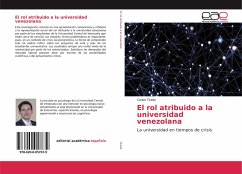Academia and the World Beyond, Volume 2
A PhD Is Not a Commitment to Academia
Herausgegeben:Madan, Christopher R.
Academia and the World Beyond, Volume 2
A PhD Is Not a Commitment to Academia
Herausgegeben:Madan, Christopher R.
- Gebundenes Buch
- Merkliste
- Auf die Merkliste
- Bewerten Bewerten
- Teilen
- Produkt teilen
- Produkterinnerung
- Produkterinnerung
A common question posed to PhD students from friends and family is, "What will you do after?" But many students are too focused on the PhD itself and have not yet had a chance to sufficiently think about post-PhD life. This book is a collection of 31 interviews with those who have completed a PhD and are now in a non-academic role. Interviewees provide background into their PhD topic and discuss how they transitioned to their current position, including what additional training was necessary and how their PhD training has helped them succeed. In these interviews, two broad non-academic career…mehr
Andere Kunden interessierten sich auch für
![Academia and the World Beyond Academia and the World Beyond]() Academia and the World Beyond22,99 €
Academia and the World Beyond22,99 €![The role attributed to the Venezuelan university The role attributed to the Venezuelan university]() Carlos TiradoThe role attributed to the Venezuelan university49,99 €
Carlos TiradoThe role attributed to the Venezuelan university49,99 €![O papel atribuído à universidade venezuelana O papel atribuído à universidade venezuelana]() Carlos TiradoO papel atribuído à universidade venezuelana50,99 €
Carlos TiradoO papel atribuído à universidade venezuelana50,99 €![El rol atribuido a la universidad venezolana El rol atribuido a la universidad venezolana]() Carlos TiradoEl rol atribuido a la universidad venezolana50,99 €
Carlos TiradoEl rol atribuido a la universidad venezolana50,99 €![O vício dos smartphones nas universidades marroquinas O vício dos smartphones nas universidades marroquinas]() Ahmed KharbachO vício dos smartphones nas universidades marroquinas31,99 €
Ahmed KharbachO vício dos smartphones nas universidades marroquinas31,99 €![Zen - the art of living consciously Zen - the art of living consciously]() Hermann CandahashiZen - the art of living consciously29,90 €
Hermann CandahashiZen - the art of living consciously29,90 €![Reimagining Mental Health and Addiction Under the Covid-19 Pandemic, Volume 1 Reimagining Mental Health and Addiction Under the Covid-19 Pandemic, Volume 1]() Reimagining Mental Health and Addiction Under the Covid-19 Pandemic, Volume 139,99 €
Reimagining Mental Health and Addiction Under the Covid-19 Pandemic, Volume 139,99 €-
-
-
A common question posed to PhD students from friends and family is, "What will you do after?" But many students are too focused on the PhD itself and have not yet had a chance to sufficiently think about post-PhD life. This book is a collection of 31 interviews with those who have completed a PhD and are now in a non-academic role. Interviewees provide background into their PhD topic and discuss how they transitioned to their current position, including what additional training was necessary and how their PhD training has helped them succeed. In these interviews, two broad non-academic career paths are explored: academic-adjacent careers use research expertise through industry, policy, and publishing; and skill-transfer careers, applying transferable abilities like critical thinking. Recognising a PhD need not lead to a faculty career opens possibilities to leverage doctoral skills in impactful new contexts.
Produktdetails
- Produktdetails
- Verlag: Springer / Springer Nature Switzerland / Springer, Berlin
- Artikelnr. des Verlages: 978-3-031-47979-3
- 2024
- Seitenzahl: 316
- Erscheinungstermin: 10. Februar 2024
- Englisch
- Abmessung: 241mm x 160mm x 23mm
- Gewicht: 641g
- ISBN-13: 9783031479793
- ISBN-10: 3031479793
- Artikelnr.: 69104321
- Herstellerkennzeichnung Die Herstellerinformationen sind derzeit nicht verfügbar.
- Verlag: Springer / Springer Nature Switzerland / Springer, Berlin
- Artikelnr. des Verlages: 978-3-031-47979-3
- 2024
- Seitenzahl: 316
- Erscheinungstermin: 10. Februar 2024
- Englisch
- Abmessung: 241mm x 160mm x 23mm
- Gewicht: 641g
- ISBN-13: 9783031479793
- ISBN-10: 3031479793
- Artikelnr.: 69104321
- Herstellerkennzeichnung Die Herstellerinformationen sind derzeit nicht verfügbar.
Dr. Christopher Madan is Assistant Professor in the School of Psychology at the University of Nottingham. He studies memory using a combination of cognitive psychology, neuroimaging, and computational modeling methods, with a particular interest in what factors makes some experiences more memorable than others (such as emotion, reward, and motor processing) and how these influences can manifest in future behavior, such as decision making. He also specializes in characterizing inter-individual differences in brain morphology, particularly with respect to aging, dementia, and cognitive abilities. Dr. Madan received a 2021 Early Career Award from the Psychonomic Society and a 2017 Rising Star award from the Association for Psychological Science. He is a Fellow of the Psychonomic Society and AdvanceHE and has been elected to the membership of the Memory Disorders Research Society.
Post-PhD Possibilities: Discovering academic-adjacent and skill-transfer career paths.- I love that something I design can become a real product that could be used to find new treatments or new biomarkers.- I'm not a researcher anymore, I'll be a scientist forever.- Make a prioritised 'life list' of all the things you desire from life - independent of any single job or career.- It was really inspiring to find companies carrying out really impressive missions.- I can see team members grow and can help them reach the next step in their career.- Being good at question-asking is a transferable skill".- Ask yourself-does this role fulfill the aspects I enjoy in my current career path?.- It's healthy to evaluate your situation and it might lead to staying where you are or finding new challenges.- My work-life balance has clearly separated boundaries.- The process of doing a PhD isn't about the outcome of the research or getting the qualification - it's about developing yourself.- I love helping people communicate their ideas and maximize the impact of their work.- Working in academia was great but I missed the work-life balance.- A PhD is a substantial training opportunity, not just a sprint to the finish.- My PhD shaped the way I think and solve problems.- Leaving academia doesn't permanently close doors.- Looking back now, I wish I'd been more honest with myself at the time and looked at alternative careers.- At NIH, there are many tasks and operations that need to be done or grants would not be reviewed and funded.- I am more passionate about supporting researchers than with any research I did during my PhD.- Look for internship or placement roles in areas that support research.- The idea of a more immediate impact of my work was very appealing.- Find something that is worthwhile to you.- The title of Dr holds significant weight when you enter the world of industry.- Being nearfamily and friends felt more important to me than continuing to pursue an academic career.- In academia, recruiters care about what you've done, outside they care about what you would be able to do next.- Having a PhD doesn't mean you'll impress people with your education, it means you have to impress them with how you apply it.- People are more often willing to connect and have a conversation than you might think.- Your PhD could serve as the most potent intellectual exercise, fuelling your entire career's journey.- I enjoy reading books before they are published and getting them polished for publication.- One of the big values of a PhD to an industry role is the proven ability to tackle a substantial project largely independently.- I like thinking about the best way to word something so that it is clear and concise.- Having a broad set of responsibilities is energizing because I hardly ever get bored.
Post-PhD Possibilities: Discovering academic-adjacent and skill-transfer career paths.- I love that something I design can become a real product that could be used to find new treatments or new biomarkers.- I'm not a researcher anymore, I'll be a scientist forever.- Make a prioritised 'life list' of all the things you desire from life - independent of any single job or career.- It was really inspiring to find companies carrying out really impressive missions.- I can see team members grow and can help them reach the next step in their career.- Being good at question-asking is a transferable skill".- Ask yourself-does this role fulfill the aspects I enjoy in my current career path?.- It's healthy to evaluate your situation and it might lead to staying where you are or finding new challenges.- My work-life balance has clearly separated boundaries.- The process of doing a PhD isn't about the outcome of the research or getting the qualification - it's about developing yourself.- I love helping people communicate their ideas and maximize the impact of their work.- Working in academia was great but I missed the work-life balance.- A PhD is a substantial training opportunity, not just a sprint to the finish.- My PhD shaped the way I think and solve problems.- Leaving academia doesn't permanently close doors.- Looking back now, I wish I'd been more honest with myself at the time and looked at alternative careers.- At NIH, there are many tasks and operations that need to be done or grants would not be reviewed and funded.- I am more passionate about supporting researchers than with any research I did during my PhD.- Look for internship or placement roles in areas that support research.- The idea of a more immediate impact of my work was very appealing.- Find something that is worthwhile to you.- The title of Dr holds significant weight when you enter the world of industry.- Being nearfamily and friends felt more important to me than continuing to pursue an academic career.- In academia, recruiters care about what you've done, outside they care about what you would be able to do next.- Having a PhD doesn't mean you'll impress people with your education, it means you have to impress them with how you apply it.- People are more often willing to connect and have a conversation than you might think.- Your PhD could serve as the most potent intellectual exercise, fuelling your entire career's journey.- I enjoy reading books before they are published and getting them polished for publication.- One of the big values of a PhD to an industry role is the proven ability to tackle a substantial project largely independently.- I like thinking about the best way to word something so that it is clear and concise.- Having a broad set of responsibilities is energizing because I hardly ever get bored.








